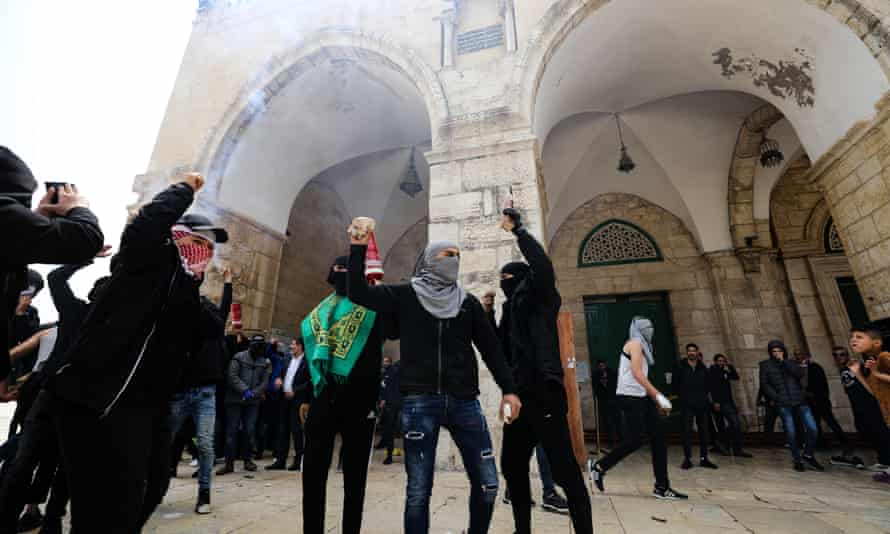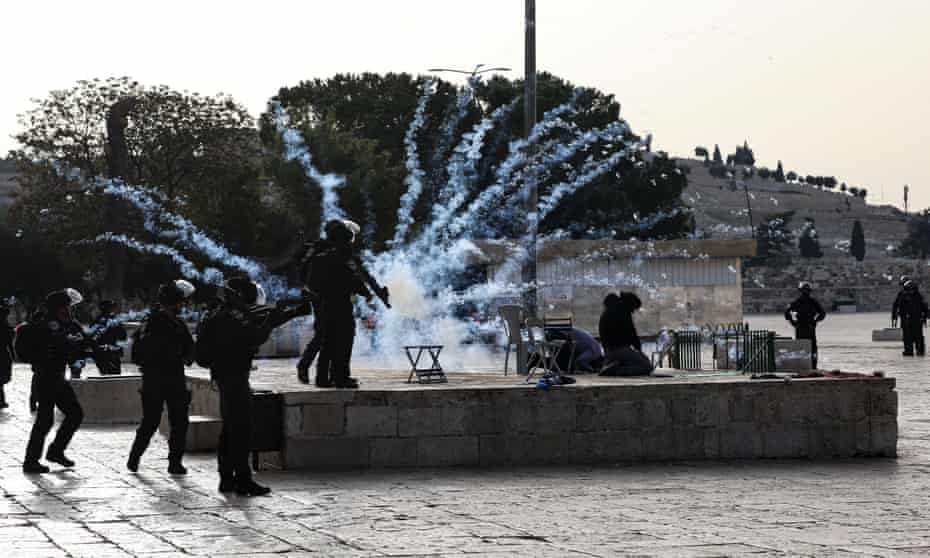More than 20 Palestinians and Israelis have been wounded in several incidents in and around Jerusalem’s al-Aqsa mosque compound, two days after major violence at the flashpoint site.
The clashes on Sunday take the number of wounded since Friday to more than 170, at a tense time when the Jewish Passover festival coincides with the Muslim fasting month of Ramadan.
They also follow deadly violence in Israel and the occupied West Bank starting in late March in which 36 people have been killed.
Early on Sunday morning, police said “hundreds” of Palestinian demonstrators inside the mosque compound started gathering piles of stones, shortly before the arrival of Jewish visitors.
Jews are allowed to visit but not to pray at the site, also known as the Temple Mount, the holiest place in Judaism and third-holiest in Islam.
Israeli police said its forces had entered the compound in order to “remove” the demonstrators and “re-establish order”.
The Palestinian Red Crescent said 19 Palestinians were wounded, including at least five who were hospitalised. It said some had been wounded with rubber-coated steel bullets.
Early on Sunday morning Jewish worshippers were seen leaving the site – barefoot for religious reasons – protected by heavily armed police.
Outside the Old City, which lies in Israeli-annexed east Jerusalem, Palestinian youths threw rocks at passing buses, smashing their windows, resulting in seven people being treated for light wounds, Shaare Zedek hospital said.
Police said they had arrested 18 Palestinians, and the public security minister, Omer Bar-Lev, said Israel would “act strongly against anyone who dares to use terrorism against Israeli citizens”.
The Israeli prime minister, Naftali Bennett, said the security forces “continue to receive a free hand … for any action that will provide security to the citizens of Israel”, while stressing every effort should be made to allow members of all religions to worship in Jerusalem.
King Abdullah II of Jordan – which serves as custodian of holy places in east Jerusalem – called on Israel on Sunday to “stop all illegal and provocative measures” that drives “further aggravation”.
Senior Palestinian official Hussein Al Sheikh said that “Israel’s dangerous escalation in the al-Aqsa compound … is a blatant attack on our holy places”, and called on the international community to intervene.

The chief of the Hamas Islamist movement, which controls the Palestinian enclave of Gaza, had earlier warned Israel that “al-Aqsa is ours and ours alone”.
“Our people have the right to access it and pray in it, and we will not bow down to [Israeli] repression and terror,” Ismail Haniyeh said in a statement.
Meanwhile, Israel’s fractious governing coalition faced a new split on Sunday when the Arab-Israeli party Raam “suspended” its membership amid the Jerusalem violence.
The government – an ideologically disparate mix of leftwing, hardline Jewish nationalist and religious parties, as well as Raam – had already lost its razor-thin majority this month when a religious Jewish member quit in a dispute over leavened bread distribution at hospitals.
Since then, the clashes around the al-Aqsa compound put Raam under pressure to quit too.
“If the government continues its steps against the people of Jerusalem … we will resign as a bloc,” Raam said in a statement, hours after the latest injuries around al-Aqsa.
The UN has called for calm, a year after clashes in and around the mosque compound escalated into an 11-day war between Israel and Palestinian militants in Gaza.
Weeks of mounting tensions saw two recent deadly attacks by Palestinians in or near the Israeli coastal city of Tel Aviv, alongside mass arrests by Israeli forces in the occupied West Bank.
A total of 14 people have been killed in attacks against Israel since 22 March.
Twenty-two Palestinians have been killed over the same period, including assailants who targeted Israelis, according to an Agence France-Presse tally.
On Friday morning, police clashed with Palestinians in the al-Aqsa compound, including inside the al-Aqsa mosque, drawing strong condemnation from Muslim countries. Some 150 people were wounded during those clashes.
The Turkish president, Recep Tayyip Erdogan, in a call on Sunday with the Palestinian president, Mahmud Abbas, said he would make contact with all sides to “end the Israeli escalation”, Abbas’ office said in a statement.
Pope Francis on Sunday prayed for peace as Christians marked Easter at the Church of the Holy Sepulchre in Jerusalem, where they believe Jesus died and was resurrected. The pontiff said in his Easter address: “May Israelis, Palestinians and all who dwell in the Holy City, together with the pilgrims, experience the beauty of peace, dwell in fraternity and enjoy free access to the holy places in mutual respect for the rights of each.”
Despite the tensions, hundreds of Christians staged a lively parade in Jerusalem, with processions led by marching bands with deafening drums and wailing bagpipes.

